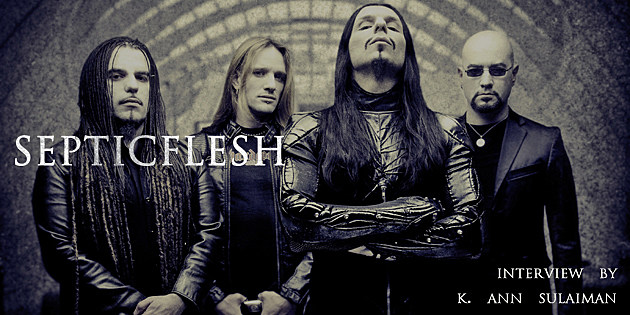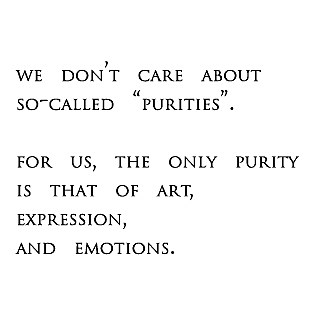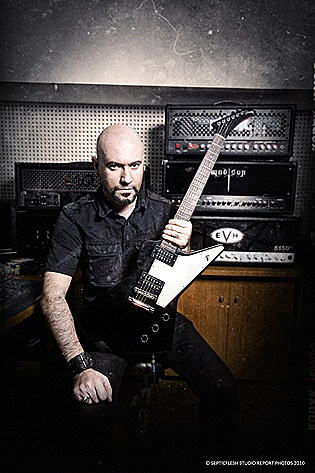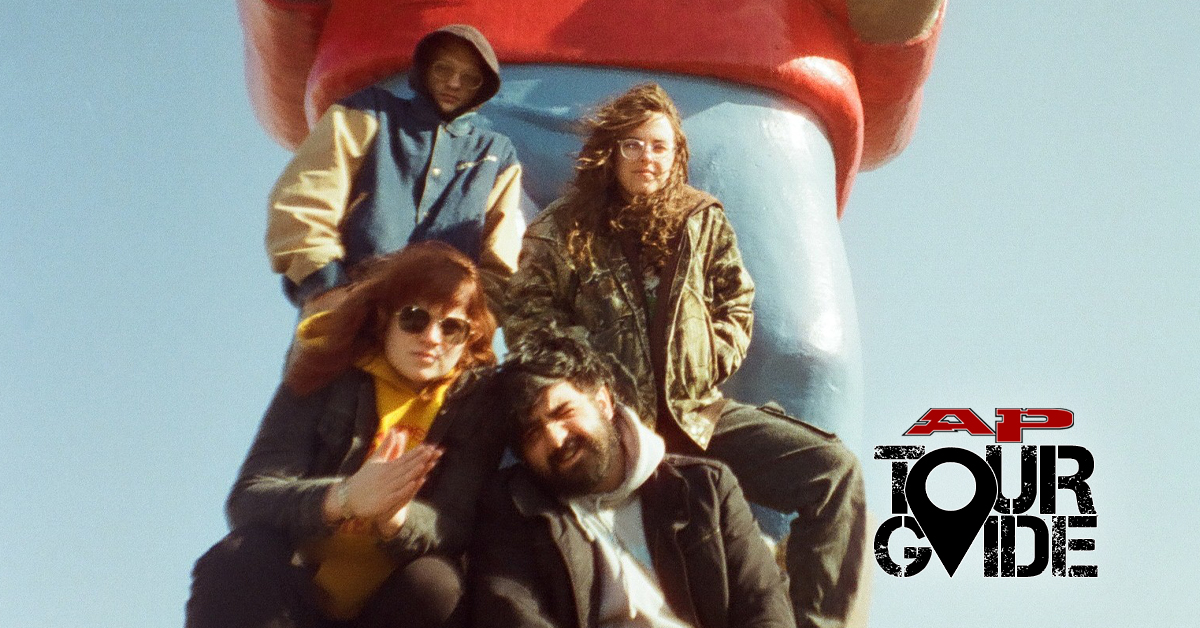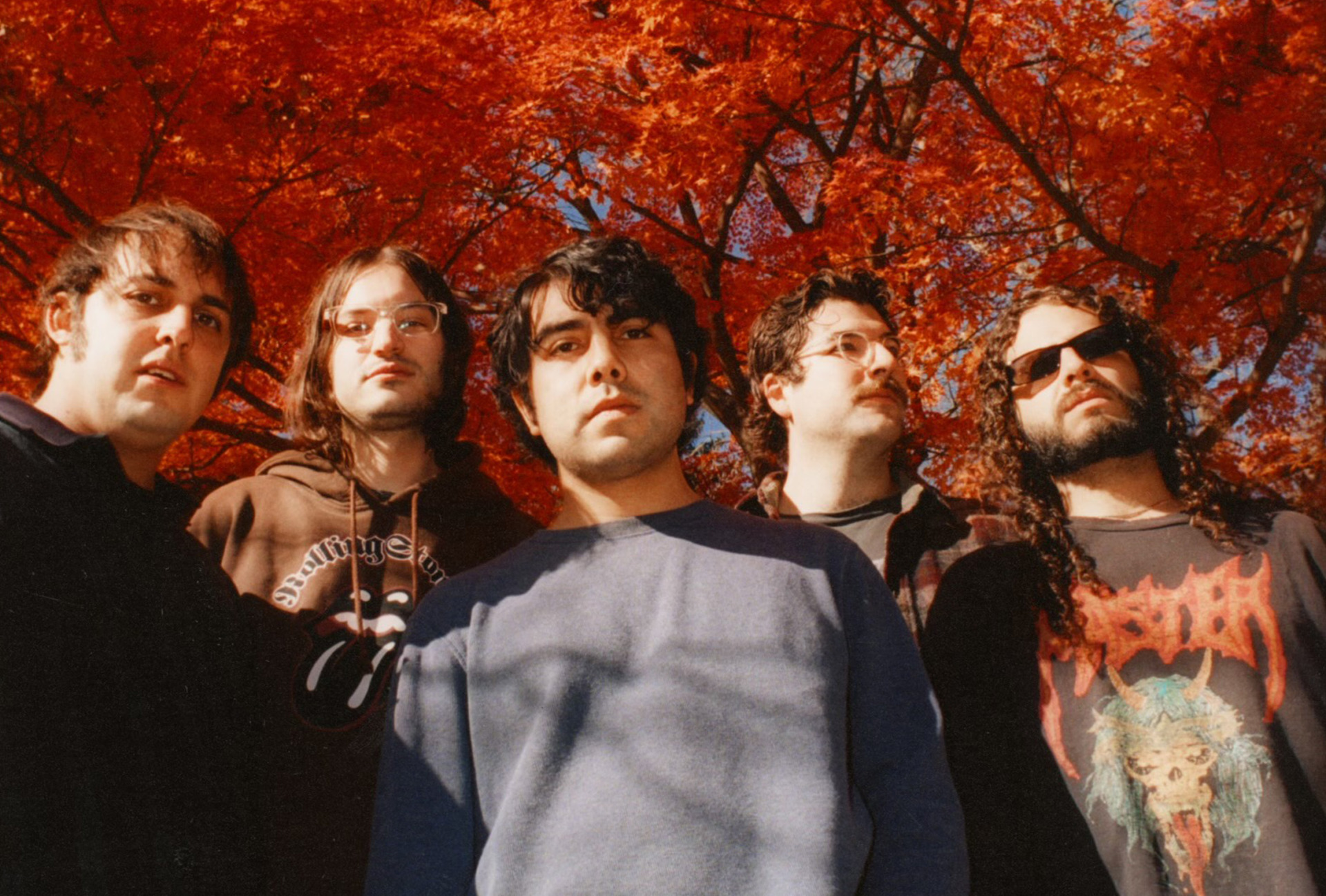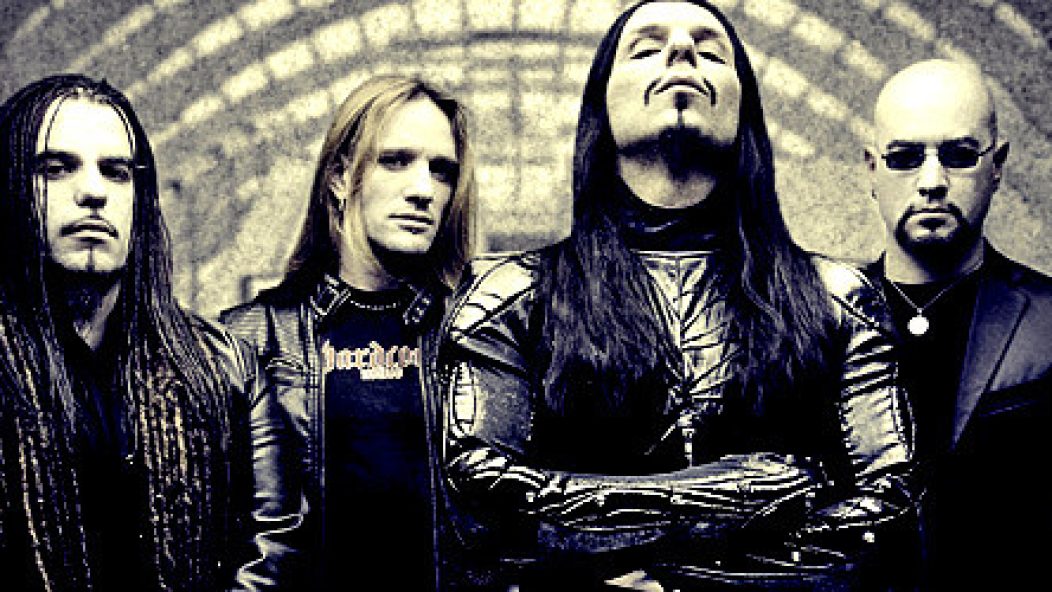
Interview: Septicflesh
. . .
Septicflesh are one of the few Greek bands with a strong following outside their home country due to being on an outside label. But this following doesn’t exist without good reason. Septicflesh are unique both musically and individually; frontman and bassist Seth Siro Anton is a professional artist who’s designed many album covers for other bands. Their latest offering, The Great Mass (Season of Mist, 2011) at first didn’t click with me. But eventually I realised that there was indeed something interesting about how Septicflesh interweave orchestral majesty with metallic brutality. So I jumped at the chance to interview guitarist/lyricist Sotiris “Annunaki” V. However, knowing that Septicflesh were on tour at the time, I found it curious that we would talk via landline.
. . .
I was surprised to hear that you don’t go on tour with Septicflesh.
Unfortunately, it’s been the case for many years that I can’t go abroad with the band. I have obligations at home with my job, and they won’t allow me to have time off for tours. Though I can play some specific shows in Greece, and just recently I got to do a special show in France as part of a metal festival. I did try to come over for Hellfest, but sadly it was a last moment thing and it wasn’t possible for the organisers to arrange.
It’s a pity, though understandable, when you take into account how difficult it is to make a living from music other than commercial pop. Not to mention ongoing fears that music is losing its recognition as a craft. Most bands that are into metal aren’t doing it because they want to make money and live off of their music! It’s just for those who want to be involved in creating metal, and I know band members around the world who don’t live off their music but have one or two other jobs to survive.
Though it seems that some of Septicflesh are actually in an unique position, particularly Seth and his brother Christos Antoniou (guitarist), who both work in the arts (fine art and composing music, respectively), as well as Fotis who teaches drums. It’s a matter of luck, as well as hard work, sacrifices, and risks. It’s not easy to just jump from a cliff and expect to land on your feet when you’re involved in just art, as there’s no certainty about how tomorrow will be.
For example, you’ve mentioned Seth and his career where he’s managed to make a name for himself as well as create many great album covers for the likes of Paradise Lost, Exodus, and Kamelot, to list a few; and Chris, who’s worked on video game soundtracks and stuff like that. But I’m sure that other people would like to be in the same position and not have to go to a normal job, where they’d have restrictions on their music. Even I have restrictions, as I’ve mentioned before.
May I ask what day job you have?
I work in a bank.
. . .
Your earlier point about job obligations is interesting, as it’s been commented before that one of the problems facing the Greek metal scene is the Hellenic attitude towards commitments, i.e., work, which seems to be a double-edged sword. For one, it keeps the Greek metal scene in the underground. I think that it’s peculiar that such a small country like Greece – which doesn’t have such a great history for churning out rock music – has so many metal bands!
I think that it’s because the metal audience here is heavily involved in music, in the sense that eight out of 10 who listen to it are also musicians. So these people will form a band and play for their own pleasure, trying to create an album and so on. But while there’s always great interest in forming a band, there are of course also some problems – for example, the military service in Greece, which is mandatory for nine months. This is what bands have to get through, especially if each member goes into the army at a different period. A lot of time passes, and then the band stays inactive with these limitations, which mean they can’t evolve. So in order to remain active, each band has to pass through a number of difficult situations, which is why many come and go or disappear and re-appear, not to mention why few have managed to go any further.
How did mandatory conscription affect Septicflesh?
The problems with the army kicked us back for about two years, which we tried to use as best as we could. Tt was the period between the release of Ophidian Wheel and A Fallen Temple. We did overcome that obstacle, and A Fallen Temple was actually a special album, as it was composed from older, unreleased material, as well as new songs – a formula which we felt would work for us without having to lose much time. And when we did disband later on, it was for our other interests – like Seth, who wanted to focus on his artwork; and Chris, who wanted to give his own music career a stronger boost. Though even when we released Sumerian Daemons back then in 2003, there were strong economic problems in our country; there were various factors that played a strong role in our decision to keep Septicflesh inactive for some time.
. . .
“A Great Mass of Death”
http://www.youtube.com/watch?v=dqTSfxAFMAg
. . .
Seems like the Greek economy’s just getting worse and worse!
You can say that it hasn’t really affected us that much, because we’re focusing on the wider [metal] scene outside of Greece. The band’s touring most of mainland Europe and North America, so we never had a direct hit from the issues at home. Our label Season of Mist is also a French label, which means it’s not a problem. Of course, we’re also citizens of Greece, so the situation in our country still affects us at least emotionally. There are a lot of riots right now [at the time of this interview], even if the economic issues don’t have a direct effect on bands like ourselves and Rotting Christ, as we don’t depend on them.
Though for those who do, in what ways has issues like the economy affected them?
I imagine that it’s only contributed to other issues which hold an impact, such as the Internet with its nature as a double-edged sword. Of course, the situation is worse if you have another job which you need to make money for your recordings and buy equipment, so there’s certainly an effect there for new bands who aren’t in the position to make sales in other countries. Naturally, everyone involved in the underground scene is depending on other jobs for an economic boost, which means they get hit by this as well, not to mention those who already have limited amounts of money from which they get choose which live gigs to attend and which CDs to buy. As you know, most are indeed downloading stuff from torrents through the Internet rather than paying for their music.
The situation is thus more difficult for underground bands, who are trying to survive and reach a higher level of popularity while depending less on other resources outside of music. However, there is also a lot of determination in people to decide on their top priorities – meaning to keep attending shows, playing music, and so on. It’s a matter of what you can sacrifice; you can drink less, for example! (laughs) People keep fighting and pursuing their dreams.
Being a musician and choosing to play metal or any kind of extreme music – you do it because there’s a deep drive inside of you to create, so it’s something for which you know from the beginning that you have to surpass many obstacles. When someone is following his dreams, he must use all his strength to pursue it if it’s difficult. I don’t see many people drawn back from it because of the economy; they’ll just withstand these problems and carry on. The situation in our country was never easy even for us, and it was also really difficult to convince other people that we come from Greece – the land of sand, Zorba dancing, and vacations – and that we played death metal. It sounded funny at first to them, but in turn we kept believing in our dream and doing things. It was never easy!
. . .
When you hear about metal in general going downhill, even today where people are commenting on it becoming the domain of middle class kids into mobile applications and online social networking, how do you feel about it especially with these issues that you’ve just described for the Hellenic scene?
Many years in the underground and metal scene, I’ve seen a lot of things going on where many trends come and go and a number of people who are involved at first then choose other directions. I’ve seen many things, but I find it amazing when I see people from the old days who are still here. I also meet people who say that they were into our band from the first album and stuff like that, which makes me feel really proud that people from the past keep the scene alive and continue to support it.
There is also the “new blood”, you could say, who start listening to metal music. Some of them will continue to do so later on, while some will just do it for the sake of impressing others at first before then leaving it behind. It’s something which doesn’t matter, for there will always be those who are dedicated to metal and those who aren’t. Assuming, of course, that there are people who love this kind of music, which is why it’s still alive, though not as strong as it was in the past.
. . .
. . .
Looking at the music of Septicflesh, it’s intriguing how you stand out from most other death metal acts with a symphonic element. You seem to use orchestral music as a blueprint for your work, rather than an aside.
We treat the creation of our music in our own way, in that we don’t think “let’s create a death metal album” or “let’s make a classical or symphonic or black album”. We just think about emotions, which is our first priority. We have the ability – especially here in Greece – to make choices about which instrument will be the most perfect vehicle to express this kind of emotion. You can even say that we had a lot of symphonic arrangements from the first LP onwards! If you happen to remember, we had the last song “Mythos”, which was about eight minutes long and symphonic in nature. We didn’t have the money at the time to use actual instruments for it, so we used synths and samples.
It’s an evolution which has progressed on throughout the years, and our guitarist Chris managed to get a degree in classical composition while he was at university in London, where he learned all the tricks of the trade. Not to forget that he was involved in creating soundtracks himself, where he was collaborating with orchestras and classical musicians, which in turn made everything easier for us.
At this point, we’re now a band who can decide if we’d like to work with the classical arrangements from day one! We’re not musicians who just put together music from our guitars and then hire someone else to completely write and create the orchestral elements for us. This is something that the audience can feel from the album. You might not have the ability to understand the musical line, but you can understand that everything being played has a purpose behind it on the song. It’s not merely inserted for an impression of false grandeur!
Knowing of the divisions of death metal and how some react strongly against symphonic parts being added to this music, how was Septicflesh received in this respect?
There’s a mixed crowd that listens to us. At first, it was a problem because for the first 10 years, it was hard to put us into a category, since it’s easier to play one kind of music where you tend to get all the people who listen to that specific type. The audience for Septicflesh, however, has to be more open-minded and able to withstand many different approaches on the same album, where we’ll have very melodic songs, extremely brutal songs, and really dark songs! They need to be more open rather than expect just one way of expression from us in order to get into the world of Septicflesh.
During our history, we’ve made various, strange changes from album to album – case in point, the change from Revolution DNA to Sumerian Daemons, which was considered unthinkable! Then we inserted the symphonic stuff and kept evolving our music, which we find to be very exciting and a wider artistic experiment, because we also play around with visuals and give much importance to the lyrical content of our records. We enjoy this, and we have many who like what we do as well, rather than just those who only want to headbang.
We don’t care about so-called “purities”. For us, the only purity is that of art, expression, and emotions. Everything that you’re listening to from our album is our emotions and what we feel, since we’re not one-dimensional people. Each person carries different emotions, which is the beauty of humankind. We’re not just an animal driven by one or two basic instincts; there’s much more to it than that!
. . .
Sotiris V.
. . .
So how do you consider metal to be a useful medium for these emotions?
What I’ve noticed in metal is that most who are involved with it just want to create, rather than get involved to make money. It’s different from someone who chooses to be involved in a pop band, where I imagine that the main reason for his decision is to make money and meet beautiful women, and nothing to do with music! (laughs) Most people who engage with metal do it for the music, and there are people who’ve heard other bands and felt great emotions in doing so – in turn getting inspiration to transmit these feelings by playing their own stuff. In my opinion, that’s the key difference because metal is an extreme decision for a person to make. And in most cases, the more restless minds produce the most artistic results, which you can also see happening through other forms of art – for example, paintings and poetry.
Obviously the people who’re expressing radical thoughts against metal as an artform are not those who’ve tried to understand this kind of music. If you don’t try to listen to it, it’s easier to say things like that. In my opinion, most kinds of music can be used through which to create songs that speak to the heart of the listener.
The most important [thing] is to be open-minded, and to feel – not to be a critic who focuses on how many notes they’ve played or their tempo. These aren’t the qualities on which one has to focus on when one listens, or even the production values. OK, high production does lead to a more powerful result, yet you can listen to a song from Bathory with shitty production values and feel great! It’s all about emotions, in my view. If a musician makes you feel great or inserts some thoughts into you, it’s good! If you feel nothing, then there’s something wrong, regardless of how many notes there are.
As for how else being open-minded relates to our band, well, you have to have a certain philosophy or mindset to guide you; the mindset for Septicflesh is centered on trying to surpass our limitations. The ideas that one holds inside are obviously built from previous experiences, such as the books one reads or the music one listens to. So if one wants to transcend the past, you have to start looking at these experiences in a different way, in order to construct from the first things that come to mind so that you can challenge yourself and your beliefs – even those about yourself.
For myself, I can say that there’s an endless war of ideas inside of me! The result of these battles in turn become my creations, which means I don’t do anything dogmatically. I simply try to present more than one side, which is also my approach to the lyrics for the band, since I never try to force my thoughts onto the audience. If you’ve noticed in the booklet for our new album The Great Mass, there are also a lot of questions at the start of the songs before the main verses because I prefer to spark curiosity rather than offer any answers. That’s something which people have to find for themselves, because I believe in the empowerment of the individual instead of the herd mentality.
. . .
It’s considered the norm to focus on Scandinavian history and the Vikings’ conquests and wars on Christianity, yet you and your countrymen like Rotting Christ and Nightfall pick events from your own backyard. Obviously, it’s what you grew up with, but how else does Greece’s history impact bands like yourselves?
Personally, I was injected with a love for history from an early age because my mother was a history teacher. There were a lot of books about the ancient worlds and philosophers, along with mythology and other things. I was already interested in the past, and as I was growing up I began to realise that the world we live in today was built gradually from the past. If someone wants a clearer view about the present, he needs to look back to see how it was created, as it gives you a more focused perspective about things.
We’re fortunate that there were so many great minds in Greece, with various different schools of philosophy. They questioned everything and also had connections through travelling and trading with other civilisations, which opened them up to new thoughts and ideas at the time. Of course, there were also a lot of wars with others like the Persian Empire, which made these interactions very intense. If someone has the ability to transcend through civilisations, he’ll find many interesting elements about humankind and our roles on earth, not to mention our interaction with the so-called “gods”.
Even ancient monuments from our past inspire us, as you can imagine, if you have an ancient temple near your house like what can happen over here! If you let your mind daydream and try to imagine how things would have been centuries ago, it’s only natural for us to take heed from such topics. We express ourselves naturally, without trying to pick a subject in order to impress people. Whenever I write the lyrics, I even daydream. I listen to the music that’s already been composed, and then go along with the emotions and images it conjures up for me, as if I’m in a trance.
. . .
“Persepolis”
. . .
So how did this process work for when you were writing the lyrics to “Persepolis”, as an example?
When I heard the music, at first I felt a kind of ancient mysticism followed by rage, which led me to realise that it would be a song about war with dark, decadent emotions and a sense of fallen majesty surrounding it. I simply closed my eyes and imagined being in Persepolis back then. There is something tragic about destroying one of the most beautiful cities of its time, and unfortunately it was a Greek person [Alexander the Great] who did this!
Usually whenever a character in a song shares the same culture or ethnicity as the musicians, their conquests or actions against other party get taken as a symbol of pride and cultural heritage.
Exactly, because recorded history presents the victor’s point of view. But this isn’t the only viewpoint, especially as in war there isn’t any greatness. War is a horrific act, and a game of life between predator and prey. There is a strange continuation of these stories, since those who win these battles will then try to erase their opponents’ past victories. Thus, singing about how we perceive the history of today is a wise thing to do, as it responds to what was written down by the “official” heroes. There are different viewpoints about the same events; there isn’t an actual rule that one must settle for one version and not see the plain truth – that it is a battle of survival with attempts of one party to dominate the other. People say that “might is right”, but is it, really?
. . .
Referring back to your words about looking to the past to understand the present, I’d like to ask about how this relates to the mythology of religion for The Great Mass, particularly because you go for a deconstructive approach to the subject. How would this relate to songs like “Pyramid God”?
There were always occult elements in our lyrics, and of course Christianity was built up on the remains of pre-existing views and symbolisms. Case in point, when you look at the eye in the triangle, it’s actually the eye of the pyramid which connects with ancient Egyptian culture. In turn, this brings up a number of connections to the early Christian people who were the Egyptians’ slaves at the time. I also find the geometry involved to be powerful, because of the strength behind such symbolism. If you combine a particular degree of knowledge to a strong, visual reference, this gives you a good way to preserve and imprint it onto the consciousness of the masses for many years to come.
It’s why I personally deem it important to play around with such imagery for my lyrics, since I can communicate to the audience through a deeper level, seeing how we were all imprinted with these symbols subconsciously. If someone has the will to go further and study occult teaching, they’ll also encounter several, fascinating implications about these images. Even in specific songs on our current album, there are many implications about the “watchers”, as in the Eye or the Trinity which draws together the mind, body and soul. However, I do think that no one actually knows the truth about these images, and that we’re basically creating [their mythology]!
Even religion, seems to be losing ground, not only in Greece but in general. With the communications going on through facilities like the Internet which can allow easier access to differing bodies of thought, the younger people tend to be less vulnerable to religious lies. However, there are always the fanatics who want to insist on their idea of truth as the only sort that’s valid. These are very dangerous people, because they can literally destroy anything which doesn’t fit in with their values. Though I believe that the situation with such groups is getting better, as compared to years ago, and that there are much stronger fanatics in the US rather than Greece.
Perhaps this could still be fuel for people to react against religion in extreme metal!
I think that whatever the artist considers important is what he should focus on. It’s not a set rule for all metallers to be anti-religion! If an artist actually supports religion, then he must use his own perspective. This is about freedom of expression in the end, which I believe to be the most important thing to fight for.
. . .
. . .
BUY A GREAT MASS
Amazon (CD)
Amazon (MP3)
Septicflesh merch @ Season of Mist
. . .
